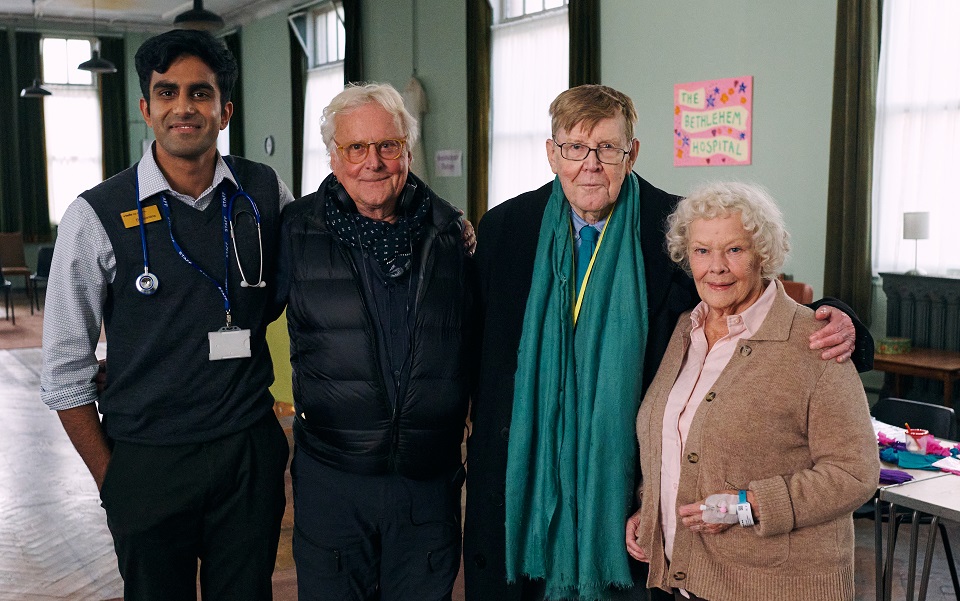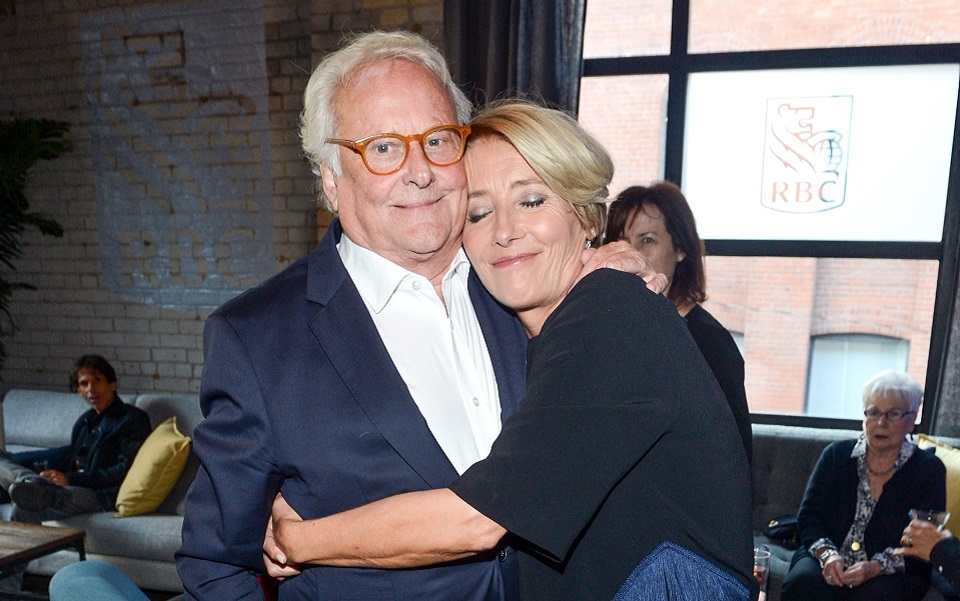Richard Eyre: ‘Usually there’s a dark side to national treasure actors’

The number of over-60s around the world will almost double from 2015 to 2050, according to the latest data from the World Health Organisation. Amid this staggering rise, the NHS is facing constant calls for further funding, and health inequality widened significantly under the pandemic. For Richard Eyre, director of Iris and Notes On A Scandal, the state of our NHS makes for rich drama.
Eyre isn’t alone in thinking so: last year’s BAFTA winning Jodie Comer drama Help proved how stimulating drama about the underfunding of the NHS can be. And now, the lives of those impacted by the challenges faced by the NHS are explored in Richard Eyre’s new film, Allelujah, adapted from the Alan Bennett play. Premiering this Sunday 9 October at the BFI London Film Festival at the Royal Festival Hall, and with further screenings next week, the picture is an emotional plea for more action to be taken by the government.
It’s about old people – a group in which I don’t, of course, include myself
Richard Eyre, who soon turns 80, jokes about his own years
“It’s about old age and care of old people – which is a group in which I don’t, of course, include myself,” jokes 79-year-old Richard Eyre down Zoom. Eyre, the former artistic director of the National Theatre, most notably directed Notes On A Scandal starring Judi Dench, who also stars in Allelujah, as well as Iris, a feature about novelist Iris Murdoch, who suffered from dementia. The topic of ageing is familiar and recurring in Eyre’s work.

“Obviously the issue of old age is of material interest to me,” he says. “What are we supposed to do with the extra years?” In Allelujah, set in an underfunded hospital in Yorkshire that’s fighting for survival, we experience the ways ageing affects people of every age: we meet angry middle-aged people thirsty for their inheritance, and emotionally detached younger people who have paper thin relationships with their elders. But the message is clear: as more of us live longer, the ‘issue’ of what it means to be older in an ageing society isn’t going away.
“The government who have underwritten the NHS have not really taken this into consideration,” according to Eyre. “The NHS is constantly under pressure and we don’t seem to be getting a public understanding of how to deal with the ‘problem’ with old age. What do we do with old age, how do you provide for the frail and vulnerable. They’re always at the end of the list. if you look at provision for care homes, it’s shocking. They’re desperately under funded.”
Alongside Dench, Allelujah stars Russell Tovey, and Jennifer Saunders in a rare straight role. In the hospital, scenes depict residents singing renditions of the classics around the piano, bringing moments of cheer. But crucially for Eyre, there are more pressing topics than joy: “I would like to be able to paint a picture of joyous old age but often the body militates against it.”

There are countless stories to tell around ageing which have still not been told. “There is so much bias now towards the young,” he says, “towards feeding a younger audience.” It’s an approach the Devon-born director believes might be counterproductive: “I think statistically you could demonstrate that a much higher proportion of older people watch television because at a certain age you don’t watch television at all. I certainly didn’t watch much television in my twenties.”
Judi Dench is as gripping as you’d ever hope in her role as a savvy resident who ends up with a crucial sleuthing role in the drama, revealing murky goings on at the hospital. Like the residents of the fictional care home, Dench, too, is ageing, and at 88, Eyre’s feeling is that these days she’s happier playing smaller roles. The Bond veteran is “reluctant to take on that responsibility and be on set every,” he says, but was very happy to be involved with Allelujah. “She was working with a lot of people that she knew and loved her.”
Some star actors would be very hard to get together – they might be all fighting over their individual territory
Richard Eyre, who’s known for all-star British casts in his films
Eyre and Dench first met in the mid-to-late sixties when he was in his mid-twenties. “We remained friends ever since,” he says, singing her praises: “She’s a very rare person in that she’s everything that people say she is. And usually people who are described as national treasures and are infinitely hugely talented, hugely generous, there’s a dark side. Well there isn’t. What you see is what she gives. And that’s a very very intelligent, witty and brilliant person and a very loyal friend.”
What might Dench and Eyre discuss when the camera stops rolling? “I guess I can just call her up and say, ‘Do you fancy being in this film, it’s not a very large part but I think you’d enjoy it?’” Eyre says of their friendship. “She doesn’t like a lot of discussion about the character and how to approach it, she likes to rely on instinct and her intelligence. She’ll ask questions that are very direct and specific and she just wants an answer to that question. She doesn’t want a whole series of explanations around the character, she’s always very precise and very specific and being specific is what makes for good performances.”
Despite the roll-call of British talent present in Allelujah, Eyre insists he hires actors “entirely on the basis of who is best for the part.” But there’s another benefit to having an ensemble of talent UK audiences are familiar with: it’s likely 50% of the actors on a UK film have worked together before because our acting scene is centralised in London unlike in the States, where theatre is east coast and film and TV is west. The chemistry that actors develop over a lifetime of working together is an easy win for UK productions, and Eyre says of casting A-Listers: “I’m sure there are gatherings of star actors who would be very hard to get together because they might be all fighting over their individual territory, but all these people are people are used to working as a company.”
I have a 50% success rate with my projects. That’s enough for me to keep going
Richard Eyre on his relationship with critics
There’s another benefit to casting star names: crafting that element of surprise. Saunders’ nurse character has a dark side revealed later in the drama, and admittedly, it’s odd seeing the Ab Fab legend playing a stern character. “I like the fact that people might approach this film thinking, ‘Oh it’s Jennifer Saunders from Ab Fab,’” says Eyre. “I enjoy the fact that people might have different expectations and that those expectations will not be realised when they see she is just a first class actor.” Next year, as Eyre enters his eighties, he’s keen to keep telling stories about people in their older years.
He has particular interest in stories around voluntary euthanasia, “to cite a not very popular subject,” and dementia, “because my mother had Alzheimer’s,” but having just written his first London play, The Snail House at the Hampstead Theatre, he also has plans for more writing. “I was obviously disappointed that it wasn’t better received by the press and maybe they had excessively high expectations of this particular first time writer,” he says – but he’ll keep going. The process of beginning to write at 79 – and working in general – “keeps the blood flowing and the heart rate up.”
“If you were put off by critics then we’d have all given up a long time ago,” he says. “If everything you do gets the thumbs down then you’d be a fool or insane not to take notice of it, but I guess I have a good 50% success rate with my projects. So that’s enough for me to keep going and have an appetite for what’s to come.”
Allelujah is released in UK cinemas on 17 February 2023. The picture has advanced screenings at the BFI London Film Festival, with one this Sunday 9 October at the Royal Festival Hall, go here to book tickets. Here are our picks from the Festival and to book tickets
